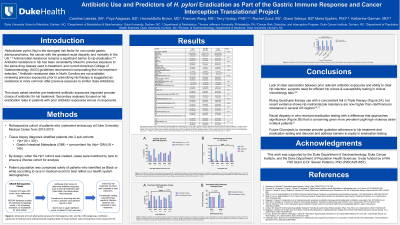Monday Poster Session
Category: Stomach
P2724 - Antibiotic Use and Predictors of H. pylori Eradication as Part of the Gastric Immune Response and Cancer Interception Translational Project
Monday, October 23, 2023
10:30 AM - 4:15 PM PT
Location: Exhibit Hall

Has Audio

Caroline Labriola, BA
Duke University
Durham, NC
Presenting Author(s)
Caroline Labriola, BA1, Katherine Garman, MD1, Meira Epplein, PhD1, Rachel Zuzul, BS1, Priya Alagesan, BS1, Hannah Sofia Brown, MD1, Frances Wang, MS1, Grace Sekaya, BA1, Terry Hyslop, PhD2
1Duke University, Durham, NC; 2Sidney Kimmel Cancer Center, Philadelphia, PA
Introduction: Helicobacter pylori (Hp) is the major risk factor for non-cardia gastric adenocarcinoma, the cancer responsible for the greatest racial disparity in mortality in the US. To address this disparity, appropriate Hp treatment is essential. Antimicrobial resistance remains a barrier to Hp eradication and has been consistently linked to prior exposure to the drug classes used in treatment. Current American College of Gastroenterology (ACG) guidelines recommend incorporating resistance data into treatment selection. In many parts of the US, antibiotic resistance data are unavailable; instead, reviewing previous antibiotic use prior to prescribing Hp therapy is suggested.
Methods: We analyzed a racially diverse retrospective cohort of 476 patients with Hp diagnosed on endoscopy (EGD) from 2015-2019, including 331 patients with Hp alone and 145 patients with gastric intestinal metaplasia with concomitant Hp. Data collection included index and all additional EGD findings, all Hp diagnoses, treatments, and retests for cure, and prior antibiotic exposures implicated in resistant infections (Macrolides, Fluoroquinolones, metronidazole).
Results: We found no association between prior antibiotic exposure and unsuccessful Hp eradication. In patients with prior exposure to the same antibiotic class used in treatment, neither macrolide (OR 0.94, 95% CI 0.45-1.94) nor metronidazole (0.94, 95% CI 0.33-2.65) exposures were associated with risk of treatment failure compared to those with no antibiotic exposures. Eradication testing after Hp therapy significantly improved from 2015 to 2019 (p< 0.0001), with a suggestion of a higher eradication testing rate for white patients than for Black patients (59.4% vs. 50.6%; p=0.069). However, the Hp eradication rate did not significantly improve over this time (p=0.608).
Discussion: While guidelines suggest that providers query prior antibiotic exposures before selecting Hp therapy, we found no association between prior antibiotic use and treatment failure. Our findings emphasize the need for more personalized Hp therapy through wider access to either efficient Hp culture and susceptibility testing or approval of clinical molecular resistance gene testing, both of which remain unavailable for widescale use within US health systems. After treatment, adherence to eradication testing is also important, and may help address racial disparities associated with Hp infection.
Disclosures:
Caroline Labriola, BA1, Katherine Garman, MD1, Meira Epplein, PhD1, Rachel Zuzul, BS1, Priya Alagesan, BS1, Hannah Sofia Brown, MD1, Frances Wang, MS1, Grace Sekaya, BA1, Terry Hyslop, PhD2. P2724 - Antibiotic Use and Predictors of H. pylori Eradication as Part of the Gastric Immune Response and Cancer Interception Translational Project, ACG 2023 Annual Scientific Meeting Abstracts. Vancouver, BC, Canada: American College of Gastroenterology.
1Duke University, Durham, NC; 2Sidney Kimmel Cancer Center, Philadelphia, PA
Introduction: Helicobacter pylori (Hp) is the major risk factor for non-cardia gastric adenocarcinoma, the cancer responsible for the greatest racial disparity in mortality in the US. To address this disparity, appropriate Hp treatment is essential. Antimicrobial resistance remains a barrier to Hp eradication and has been consistently linked to prior exposure to the drug classes used in treatment. Current American College of Gastroenterology (ACG) guidelines recommend incorporating resistance data into treatment selection. In many parts of the US, antibiotic resistance data are unavailable; instead, reviewing previous antibiotic use prior to prescribing Hp therapy is suggested.
Methods: We analyzed a racially diverse retrospective cohort of 476 patients with Hp diagnosed on endoscopy (EGD) from 2015-2019, including 331 patients with Hp alone and 145 patients with gastric intestinal metaplasia with concomitant Hp. Data collection included index and all additional EGD findings, all Hp diagnoses, treatments, and retests for cure, and prior antibiotic exposures implicated in resistant infections (Macrolides, Fluoroquinolones, metronidazole).
Results: We found no association between prior antibiotic exposure and unsuccessful Hp eradication. In patients with prior exposure to the same antibiotic class used in treatment, neither macrolide (OR 0.94, 95% CI 0.45-1.94) nor metronidazole (0.94, 95% CI 0.33-2.65) exposures were associated with risk of treatment failure compared to those with no antibiotic exposures. Eradication testing after Hp therapy significantly improved from 2015 to 2019 (p< 0.0001), with a suggestion of a higher eradication testing rate for white patients than for Black patients (59.4% vs. 50.6%; p=0.069). However, the Hp eradication rate did not significantly improve over this time (p=0.608).
Discussion: While guidelines suggest that providers query prior antibiotic exposures before selecting Hp therapy, we found no association between prior antibiotic use and treatment failure. Our findings emphasize the need for more personalized Hp therapy through wider access to either efficient Hp culture and susceptibility testing or approval of clinical molecular resistance gene testing, both of which remain unavailable for widescale use within US health systems. After treatment, adherence to eradication testing is also important, and may help address racial disparities associated with Hp infection.
Disclosures:
Caroline Labriola indicated no relevant financial relationships.
Katherine Garman indicated no relevant financial relationships.
Meira Epplein indicated no relevant financial relationships.
Rachel Zuzul indicated no relevant financial relationships.
Priya Alagesan indicated no relevant financial relationships.
Hannah Sofia Brown indicated no relevant financial relationships.
Frances Wang indicated no relevant financial relationships.
Grace Sekaya indicated no relevant financial relationships.
Terry Hyslop indicated no relevant financial relationships.
Caroline Labriola, BA1, Katherine Garman, MD1, Meira Epplein, PhD1, Rachel Zuzul, BS1, Priya Alagesan, BS1, Hannah Sofia Brown, MD1, Frances Wang, MS1, Grace Sekaya, BA1, Terry Hyslop, PhD2. P2724 - Antibiotic Use and Predictors of H. pylori Eradication as Part of the Gastric Immune Response and Cancer Interception Translational Project, ACG 2023 Annual Scientific Meeting Abstracts. Vancouver, BC, Canada: American College of Gastroenterology.
